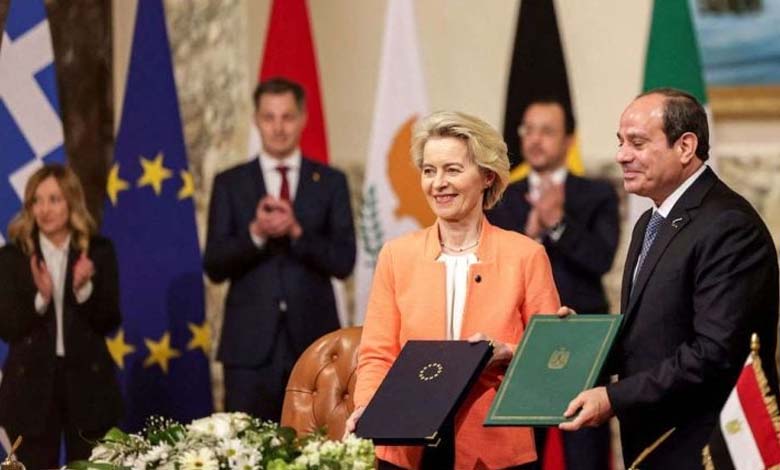European Funding for Egypt in the Billions to Halt Migrant Flow
The agreement between the European Union and Egypt aims to enhance cooperation in areas including renewable energy, trade, and security to support the struggling economy

The European Union on Sunday evening signed agreements worth 7.4 billion euros with Egypt over four years in various fields, including loans, aids, and investments, to develop relations in an effort to halt the flow of migrants across the Mediterranean Sea.
A European official told Agence France-Presse that these agreements fall within a “comprehensive strategic partnership” between the European Union and Egypt, including “loans worth five billion euros, investments worth 1.8 billion euros, and 400 million euros of aid for bilateral projects as well as 200 million euros to support programs addressing migration issues,” according to the senior official who requested not to be identified.
A high-level European delegation led by Ursula von der Leyen, President of the European Commission, will visit Cairo on Sunday to sign a financing agreement of up to 7 billion euros over three years, according to well-informed sources.
The European delegation will include the Prime Ministers of Greece, Italy, and Belgium, which currently holds the presidency of the European Union.
The agenda will include discussions with Egyptian President Abdul Fattah al-Sisi on migrant issues, energy, climate, and investments. Additionally, the visit will lead to the signing of an agreement to elevate relations between Egypt and the European Union to the level of a comprehensive strategic partnership.
The agreement aims to enhance cooperation in areas such as renewable energy, trade, and security, by providing grants, loans, and other forms of financing over the next three years to support the struggling Egyptian economy.
European governments have long been concerned about the risk of instability in Egypt, a country of 106 million people grappling with obtaining foreign currency and where economic hardships have led to a growing number of emigrations in recent years.
Inflation is nearing record levels, and many Egyptians say they are struggling to make ends meet. However, last month, financial pressure on the government eased as Egypt struck a record deal to attract Emirati investments, expanded its loan program with the International Monetary Fund, and sharply devalued its currency.
Diplomats say Egypt’s strategic importance has been highlighted by the ongoing conflict in neighboring Sudan, which has caused the largest displacement crisis in the world, as well as the war in Gaza, adjacent to the Egyptian Sinai Peninsula.
Egypt is the primary conduit for international humanitarian aid sent to Gaza, and it is attempting, alongside Qatar and the United States, to broker a ceasefire between Israel and Hamas.
Egyptian Finance Minister Mohamed Maait said the government has raised a total of $20 billion in multilateral support after increasing its borrowing and economic reform program with the International Monetary Fund.
Egyptian officials argue that Egypt deserves recognition for hosting around nine million foreign residents and largely stemming illegal immigration along its northern coasts since 2016.
However, there has been an increase in the number of Egyptians attempting to reach Europe via Libya, and the European Union is already providing funding aimed at reducing these flows.
In recent months, the Greek islands of Crete and Gavdos have seen a sharp rise in incoming migrants, most of them from Egypt, Bangladesh, and Pakistan, placing additional strain on ill-prepared authorities and raising concerns of new smuggling routes in the Mediterranean.
Activists criticize Western support for Egyptian President Abdul Fattah al-Sisi, who took power a decade ago after leading the overthrow of Egypt’s first democratically elected president.
Human rights groups say tens of thousands of people have been imprisoned in a crackdown targeting opponents from various political spectrums. Sisi‘s supporters argue that security measures are necessary to achieve stability in Egypt after the turmoil of the Arab Spring uprising in 2011 and to pave the way for the provision of social rights such as housing and employment.
The European Union’s efforts to provide financing in exchange for migration restrictions in other countries, including Tunisia, have encountered obstacles and criticism, according to Human Rights Watch, which calls the plans to enhance relations with Egypt and provide new funding “the same old flawed formula.”












